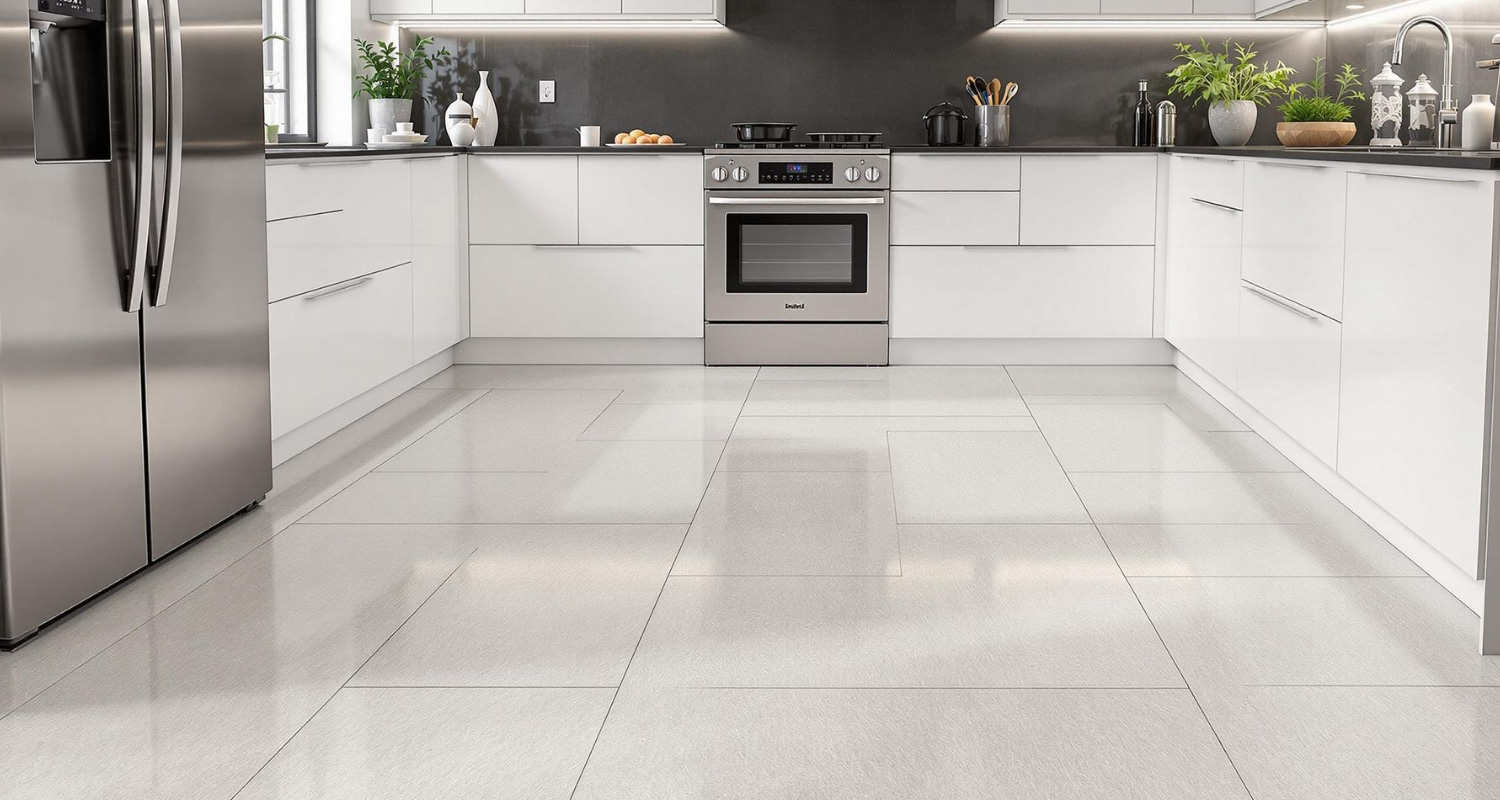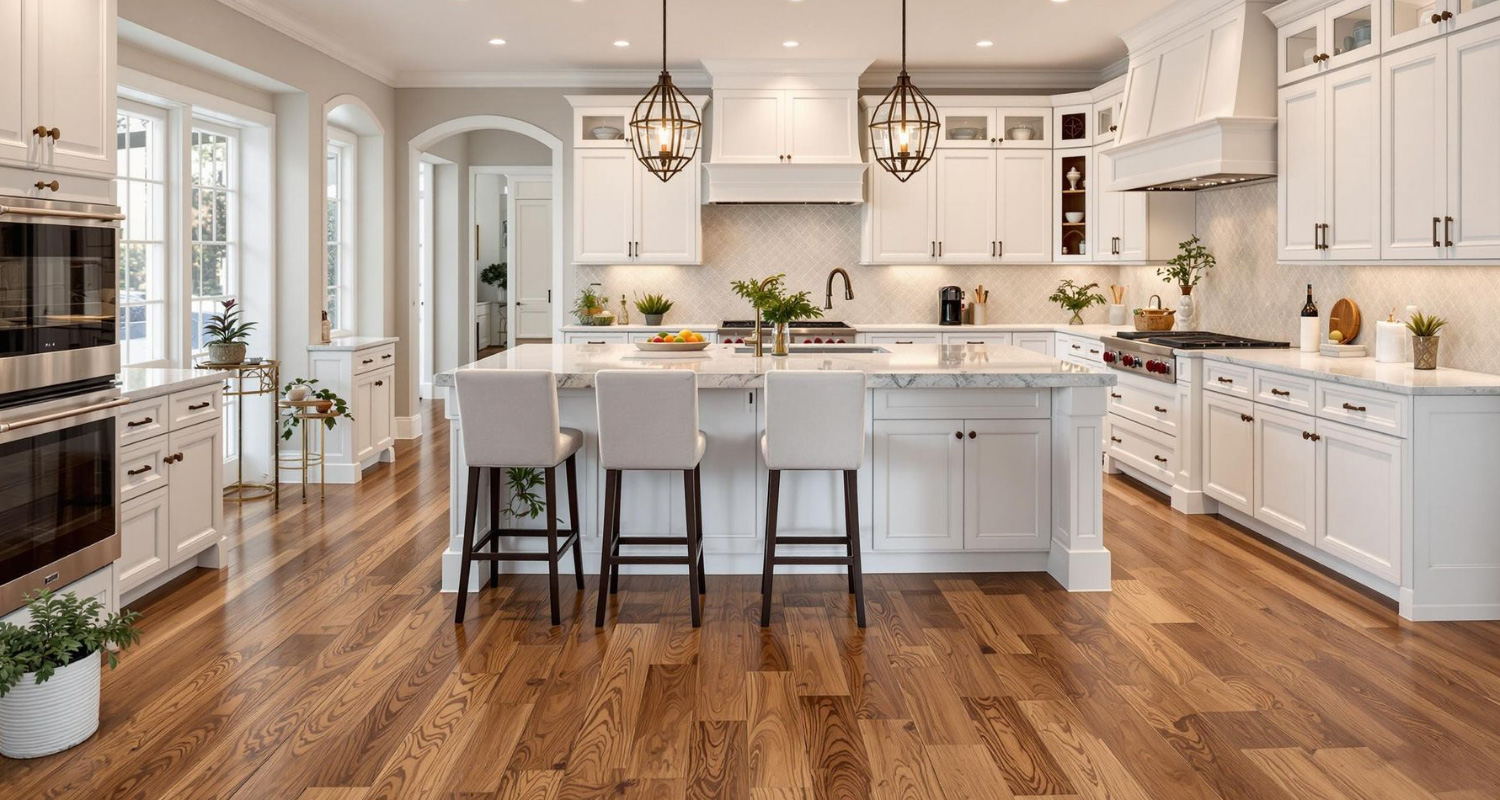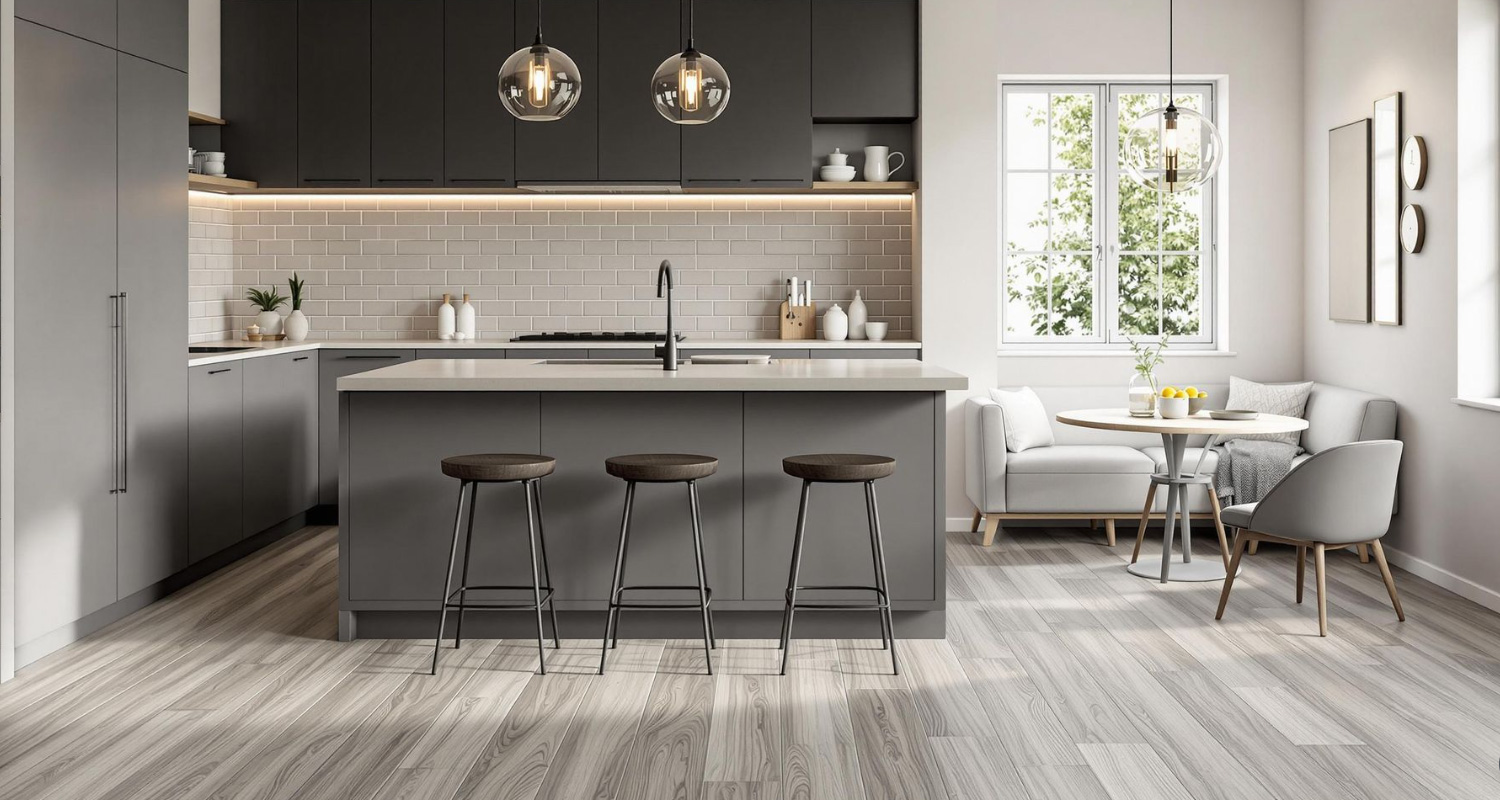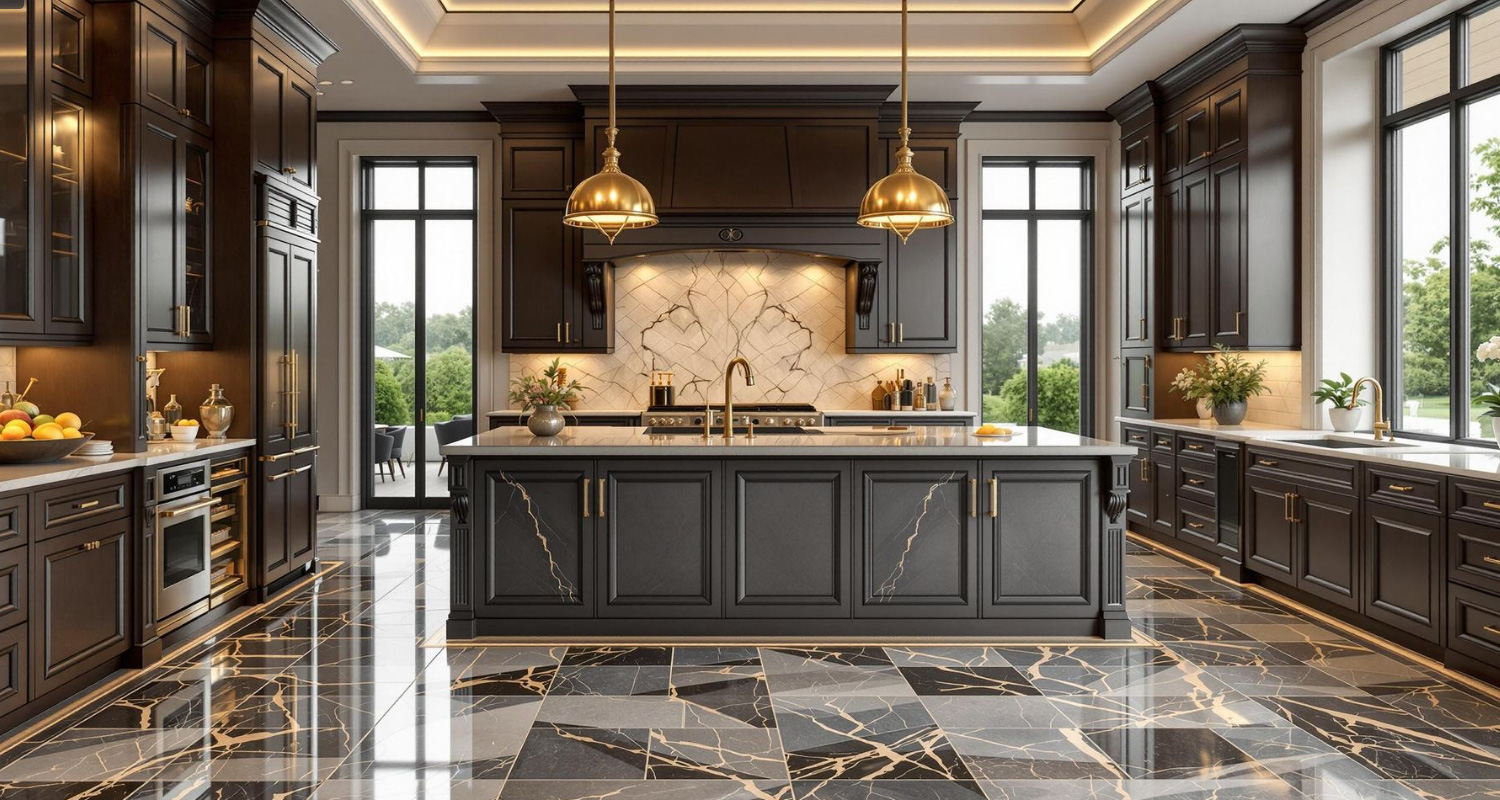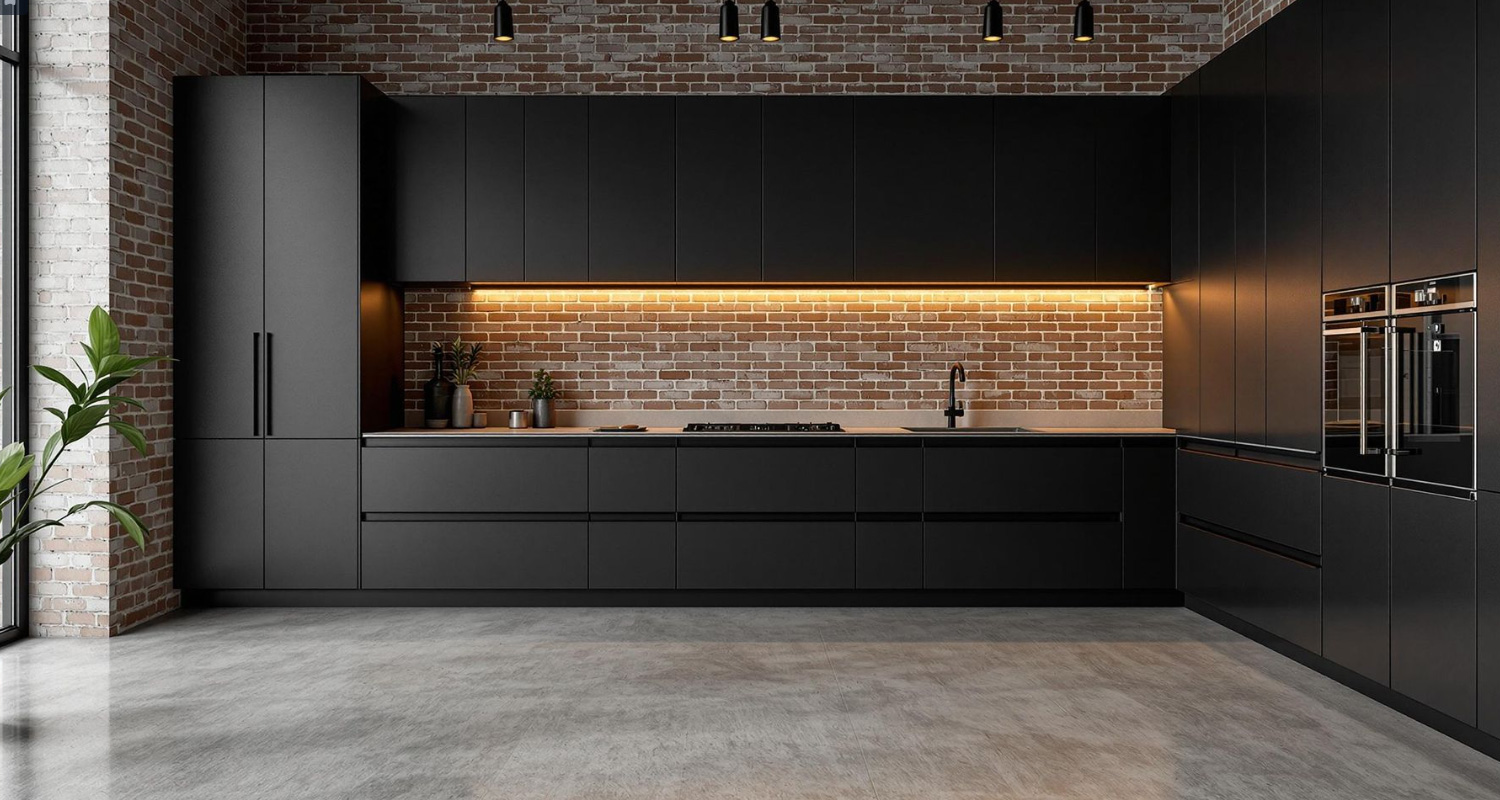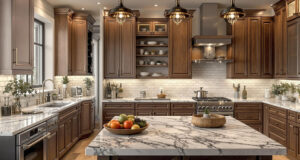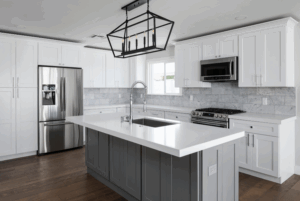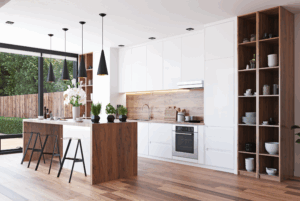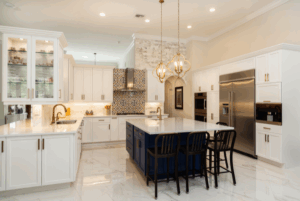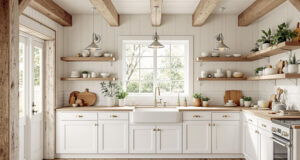Introduction
The kitchen is the heart of the home—where families gather, meals are prepared, and memories are made. With constant foot traffic, spills, and potential wear and tear, choosing the best flooring materials for your kitchen is crucial. The right flooring enhances aesthetics, improves functionality, and even increases home value.
Imagine investing in a high-end kitchen remodel, but selecting the wrong flooring material—one that stains easily, scratches quickly, or becomes slippery when wet. Not only would it diminish the beauty of your kitchen, but it could also lead to costly repairs or replacements.
At Michael Nash Design, Build & Homes, we understand the importance of choosing high-quality, durable flooring materials that match your lifestyle. Our award-winning remodeling services in Fairfax, VA, ensure homeowners find elegant, functional, and long-lasting flooring solutions.
Key Considerations for Selecting Kitchen Flooring
Before diving into the best flooring materials for kitchens, let’s explore five key factors that should influence your decision.
1. Durability
Your kitchen is a high-traffic area. From kids running around to heavy appliances, the flooring must withstand daily wear and tear. Some materials, like porcelain tile and luxury vinyl plank (LVP), are exceptionally durable, while others, like hardwood, require more maintenance to stay in top condition.
Pro Tip: If you love the look of wood but need durability, engineered hardwood or LVP could be great alternatives.
2. Water and Stain Resistance
Spills happen—frequently. Whether it’s water from the sink, grease from cooking, or red wine mishaps, the best kitchen flooring should resist stains and moisture.
- Waterproof options: Porcelain tile, luxury vinyl, and sealed concrete.
- Moisture-sensitive options: Solid hardwood and laminate (unless properly sealed).
If you’re a homeowner in Fairfax, VA, investing in a moisture-resistant flooring option will protect your kitchen from Virginia’s humidity and temperature fluctuations.
3. Maintenance Requirements
Nobody wants to spend hours scrubbing kitchen floors. Choosing low-maintenance materials will save time and effort.
- Easy-to-clean options: Porcelain tile, vinyl, and linoleum.
- High-maintenance options: Hardwood (requires refinishing) and natural stone (needs sealing).
Fact: Ceramic tile only requires regular sweeping and occasional mopping, making it one of the easiest-to-maintain flooring choices.
4. Comfort and Safety
If you spend long hours cooking or baking, your flooring should provide comfort underfoot and reduce strain on your joints. Additionally, slip resistance is critical, especially for children and elderly family members.
- Soft underfoot options: Cork, rubber, and luxury vinyl.
- Slip-resistant materials: Textured tiles, natural stone, and rubber flooring.
Safety Tip: Glossy tiles may look beautiful, but they can become extremely slippery when wet. Opt for matte or textured finishes for better grip.
5. Aesthetic Appeal
Your kitchen flooring should complement your overall home design. Whether you prefer a modern, rustic, or traditional look, there are endless styles, colors, and finishes available.
- For a sleek, modern kitchen: Polished concrete or large-format porcelain tiles.
- For a warm, cozy feel: Hardwood or bamboo flooring.
- For a timeless, classic design: Natural stone or ceramic tile.
1. Porcelain and Ceramic Tile – A Timeless and Durable Choice
Overview
Porcelain and ceramic tile are among the best flooring materials for kitchens, offering exceptional durability, water resistance, and design versatility. These tiles are made from clay and other natural materials, fired at high temperatures to create a dense, strong surface.
- Porcelain tile is denser and more water-resistant than ceramic, making it ideal for high-moisture environments like kitchens.
- Ceramic tile is slightly more porous but still offers excellent resistance to spills and stains.
Both options are available in endless colors, patterns, and textures, allowing homeowners to customize their kitchen floors to match their desired aesthetic. Whether you prefer the look of classic stone, wood, or sleek modern tiles, porcelain and ceramic offer something for every style.
Pros of Porcelain and Ceramic Tile
✅ High Durability and Longevity
Porcelain and ceramic tiles can last decades when properly installed and maintained. They resist scratches, dents, and daily wear, making them an excellent choice for high-traffic kitchens.
✅ Excellent Water and Stain Resistance
Unlike wood or laminate, tile flooring is naturally water-resistant. Porcelain tiles, in particular, absorb less than 0.5% of water, making them impervious to spills and stains—an essential feature for kitchens where messes are common.
✅ Wide Range of Styles and Colors
Tile can mimic high-end materials like marble, hardwood, and concrete at a fraction of the cost. Whether you’re aiming for a rustic farmhouse look or a sleek, minimalist design, there’s a tile to match your vision.
- Wood-look tile: Provides the warmth of hardwood with the durability of tile.
- Marble-look tile: Creates a luxurious, high-end kitchen aesthetic.
- Textured tile: Offers enhanced slip resistance for safety.
Cons of Porcelain and Ceramic Tile
❌ Can Be Cold and Hard Underfoot
Tile does not provide the warmth and cushioning that softer flooring materials like cork or vinyl offer. If you spend long hours standing in the kitchen, consider using area rugs or anti-fatigue mats for extra comfort.
❌ Grout Lines Require Regular Cleaning
While the tiles themselves are easy to clean, the grout lines can trap dirt and stains over time. Choosing a darker grout color can help minimize visible stains, but regular sealing and scrubbing are still recommended.
Maintenance Tips for Porcelain and Ceramic Tile
Sweep or Vacuum Regularly – Removes dirt and debris that could scratch the tile surface.
Mop with Warm Water and a Mild Cleaner – Avoid harsh chemicals that can damage the glaze or discolor grout.
Seal Grout Lines Periodically – Prevents moisture and stains from seeping in, keeping your floors looking new.
Pro Tip: If you live in an area with cold winters, consider installing radiant floor heating beneath your tile to eliminate the discomfort of cold flooring.
For homeowners in Fairfax, VA, looking for durable, stylish, and low-maintenance kitchen flooring, porcelain and ceramic tile are top contenders. With endless design options, waterproof capabilities, and long-term durability, they are an excellent investment for any kitchen renovation.
2. Hardwood Flooring – A Classic and Elegant Kitchen Choice
Overview
Hardwood flooring is a timeless, elegant option that brings warmth and natural beauty to any kitchen. Known for its rich textures, deep grains, and luxurious appeal, hardwood floors create a high-end aesthetic that enhances home value.
Many high-income homeowners and luxury custom home seekers prefer genuine hardwood flooring because of its authenticity, durability, and ability to be refinished multiple times. While hardwood requires extra care in a kitchen environment, proper maintenance and sealing can help preserve its beauty for decades.
There are two primary types of hardwood flooring:
- Solid Hardwood: Made from 100% natural wood, this flooring is durable but more susceptible to moisture.
- Engineered Hardwood: Constructed with a real wood veneer over a plywood core, making it more resistant to humidity and warping.
Pros of Hardwood Flooring
✅ Timeless Aesthetic Appeal
Hardwood floors offer a warm, inviting, and luxurious look that never goes out of style. Unlike some flooring materials that may feel outdated over time, natural wood enhances any kitchen design—from modern to traditional farmhouse styles.
Popular hardwood choices for kitchens include:
- Oak – Highly durable with a strong grain pattern.
- Maple – Lighter in color with a smooth, uniform grain.
- Hickory – Exceptionally tough and resistant to wear.
- Walnut – Rich, dark tones that add depth and elegance.
✅ Can Be Refinished Multiple Times
Unlike vinyl or laminate, solid hardwood flooring can be sanded and refinished multiple times, allowing homeowners to restore its original beauty instead of replacing it.
Case Study: A homeowner in Fairfax, VA, refinished their 30-year-old oak flooring instead of replacing it, saving over 50% on renovation costs while maintaining the home’s historic charm.
Cons of Hardwood Flooring
❌ Susceptible to Water Damage
Hardwood is porous, meaning spills, humidity, and leaks can cause warping, swelling, or staining. If you live in a humid climate like Northern Virginia, engineered hardwood is a better option for kitchens.
❌ Requires Regular Maintenance
To keep hardwood looking pristine, you need to clean spills immediately, avoid excessive moisture, and use protective finishes. Over time, it may require re-sanding and refinishing to remove scratches and wear marks.
Maintenance Tips for Hardwood Flooring
Sweep Daily and Use a Damp Mop – Avoid soaking the wood with excessive water.
Wipe Spills Immediately – Water left on the surface can cause swelling and warping.
Use Area Rugs and Furniture Pads – Protects against scratches from chairs, appliances, and high foot traffic.
Refinish Every 7-10 Years – Keeps the wood looking new and polished.
Pro Tip: If you love the look of hardwood but need water resistance, consider engineered hardwood or luxury vinyl plank (LVP) as an alternative.
Hardwood flooring remains a premium choice for homeowners who want a classic, upscale kitchen aesthetic. While it requires careful maintenance, its ability to be refinished and its long-term durability make it a valuable investment.
For homeowners in Fairfax, VA, looking for kitchen remodeling solutions, Michael Nash Design, Build & Homes specializes in installing and refinishing custom hardwood flooring to complement luxury kitchen renovations.
3. Luxury Vinyl Plank (LVP) – A Waterproof and Budget-Friendly Choice
Overview
Luxury Vinyl Plank (LVP) has quickly become one of the best flooring materials for kitchens, thanks to its affordability, water resistance, and realistic wood or stone appearance. If you love the look of hardwood but need something more durable and cost-effective, LVP is an excellent alternative.
Unlike traditional vinyl, LVP is thicker and features multiple layers, including:
- A protective wear layer that resists scratches and stains.
- A realistic printed design layer that mimics wood, stone, or tile.
- A waterproof core that prevents moisture damage.
- A soft backing layer for comfort and sound absorption.
LVP is a great choice for families, pet owners, and homeowners who want style and durability without the high cost of natural materials.
Pros of Luxury Vinyl Plank (LVP)
✅ 100% Waterproof and Durable
One of the biggest advantages of LVP is its waterproof construction, making it ideal for kitchens prone to spills and moisture. Unlike hardwood or laminate, LVP won’t swell, warp, or stain when exposed to liquids.
✅ Comfortable Underfoot
Unlike ceramic tile or hardwood, LVP has a softer, more cushioned feel, making it more comfortable for long hours of standing. Some brands even offer extra-thick padding to improve comfort and sound absorption.
✅ Easy Installation
LVP is designed for quick and easy installation, making it a favorite among DIY homeowners and contractors. The click-lock system allows planks to snap together without glue or nails, and it can be installed directly over existing flooring.
Cons of Luxury Vinyl Plank (LVP)
❌ May Not Have the Prestige of Natural Materials
While LVP offers realistic wood and stone visuals, it doesn’t increase home value like genuine hardwood or natural stone. However, high-quality LVP brands can still create a luxurious aesthetic.
❌ Potential for Fading with Prolonged Sun Exposure
Over time, direct sunlight can cause LVP colors to fade. If your kitchen has large windows or skylights, consider using UV-protective window coverings to preserve the floor’s appearance.
Maintenance Tips for Luxury Vinyl Plank (LVP)
Sweep Regularly – Removes dirt, debris, and small particles that could cause scratches.
Mop Occasionally with a Damp Cloth – Use a mild cleaner and avoid harsh chemicals that could damage the protective wear layer.
Avoid Dragging Heavy Furniture – Use felt pads or furniture sliders to prevent indentations and scratches.
Pro Tip: To extend the lifespan of your LVP flooring, place doormats at entryways to reduce dirt and grit buildup.
For homeowners in Fairfax, VA, looking for a cost-effective, stylish, and low-maintenance kitchen flooring solution, LVP is an excellent choice. It provides waterproof protection, comfort, and an upscale appearance at a fraction of the cost of hardwood or stone.
4. Laminate Flooring – A Budget-Friendly Hardwood Alternative
Overview
Laminate flooring is a cost-effective, stylish alternative to hardwood, offering a similar wood-like appearance at a fraction of the price. Many homeowners choose laminate because it provides scratch resistance, easy installation, and durability without the high maintenance demands of natural wood.
Laminate consists of four layers:
- Wear Layer – Protects against scratches, stains, and fading.
- Design Layer – High-resolution images that mimic real wood or stone.
- Core Layer – A dense fiberboard for structural stability.
- Backing Layer – Provides moisture resistance and soundproofing.
While laminate is affordable and visually appealing, it’s important to note that it’s not waterproof, which makes it less ideal for moisture-prone kitchens unless sealed properly.
Pros of Laminate Flooring
✅ Scratch-Resistant Surface
Laminate flooring has a tough, protective top layer that resists scratches from pet claws, dropped utensils, and furniture movement. This makes it ideal for families with kids and pets who need a low-maintenance yet stylish flooring option.
✅ Easy to Install and Maintain
Most modern laminate planks feature a click-and-lock system, allowing for quick DIY installation without glue or nails. Laminate can also be installed over existing flooring, reducing labor costs.
Case Study: A homeowner in Fairfax, VA, replaced their old tile floor with laminate, completing the installation in one weekend and saving over $2,000 in professional labor costs.
Cons of Laminate Flooring
❌ Not Waterproof – Susceptible to Moisture Damage
Unlike Luxury Vinyl Plank (LVP) or porcelain tile, laminate is not waterproof. If spills aren’t cleaned immediately, moisture can seep into the seams, causing warping and swelling.
❌ Cannot Be Refinished
Unlike hardwood, laminate flooring cannot be sanded or refinished. If it gets damaged, the only solution is to replace the affected planks.
Maintenance Tips for Laminate Flooring
Sweep or Vacuum Regularly – Prevents dirt buildup that could scratch the wear layer.
Avoid Excessive Moisture During Cleaning – Use a damp mop rather than soaking the floor. Standing water can cause warping.
Use Protective Pads Under Furniture – Prevents dents and scratches, extending the floor’s lifespan.
Pro Tip: If you want a water-resistant laminate option, look for “waterproof-rated” laminate with a moisture-resistant core.
Laminate flooring is an affordable, stylish, and easy-to-install alternative to hardwood, making it a great choice for budget-conscious homeowners. However, because it isn’t waterproof, it requires careful maintenance in a kitchen setting.
For homeowners in Fairfax, VA, seeking affordable kitchen flooring solutions, Michael Nash Design, Build & Homes offers expert guidance on choosing the best flooring materials for long-lasting results.
5. Natural Stone – An Elegant and Durable Kitchen Flooring Option
Overview
Natural stone flooring is one of the most luxurious and durable choices for kitchens. It offers unique, natural patterns, making each tile distinct, adding an elegant touch to any home. Because it’s sourced directly from nature, stone flooring is strong, long-lasting, and increases home value.
Popular natural stone options for kitchens include:
- Granite – Extremely hard, scratch-resistant, and available in a variety of colors.
- Marble – Luxurious and elegant, but requires sealing to prevent staining.
- Slate – Textured and slip-resistant, making it ideal for high-traffic kitchens.
- Travertine – Offers a warm, rustic look but is more porous than other stones.
- Limestone – Soft and smooth, often found in classic or contemporary designs.
While natural stone flooring is highly durable, it does require regular maintenance, especially in moisture-prone areas like the kitchen.
Pros of Natural Stone Flooring
✅ Unique, Natural Patterns
Since no two stone tiles are the same, natural stone provides an organic, high-end aesthetic that enhances luxury and custom home designs. The variety of colors, patterns, and finishes allows homeowners to create one-of-a-kind kitchen flooring.
✅ Highly Durable
Natural stone is one of the toughest flooring materials available, with granite and slate being particularly resistant to scratches, chips, and heavy foot traffic. Properly maintained stone floors can last a lifetime.
Case Study: A Fairfax, VA homeowner installed granite flooring in their kitchen, which has remained scratch-free and visually stunning for over 15 years, thanks to regular sealing and proper maintenance.
Cons of Natural Stone Flooring
❌ High Cost and Professional Installation Required
Natural stone is one of the most expensive flooring materials, with marble and granite costing significantly more than vinyl or laminate. Additionally, professional installation is required, increasing overall project costs.
Estimated Costs Per Square Foot:
- Granite – $6 to $20
- Marble – $10 to $40
- Slate – $5 to $15
- Travertine – $4 to $15
- Limestone – $5 to $30
❌ Porous Surfaces May Need Sealing
Some stones, like marble, travertine, and limestone, are highly porous and can absorb liquids, leading to stains. To prevent moisture damage, regular sealing is required every 6 to 12 months.
Maintenance Tips for Natural Stone Flooring
Regular Sealing to Prevent Stains – Use a penetrating sealer to protect against water and oil absorption.
Sweep or Vacuum Frequently – Removes dirt that could scratch the surface.
Use pH-Neutral Cleaners – Avoid acidic cleaners like vinegar or lemon juice, which can damage the stone’s surface.
Wipe Spills Immediately – Prevents moisture from seeping into porous stones.
Pro Tip: If you want the elegance of natural stone without the high maintenance, consider porcelain tiles that mimic natural stone textures—offering similar aesthetics with added durability.
For homeowners in Fairfax, VA, looking for a high-end kitchen upgrade, natural stone flooring is a top-tier choice. With its elegance, durability, and unique appearance, it enhances luxury home designs while adding resale value. However, due to its porous nature, proper sealing and maintenance are essential for long-term performance.
6. Cork Flooring – An Eco-Friendly and Comfortable Kitchen Flooring Choice
Overview
Cork flooring is a sustainable, comfortable, and stylish option for kitchens, making it a favorite among eco-conscious homeowners. Harvested from the bark of cork oak trees, it is a renewable and biodegradable material that regenerates naturally without harming the tree.
One of cork’s standout features is its soft, cushioned texture, making it an excellent choice for those who spend long hours cooking or entertaining. Additionally, it has natural antimicrobial properties, which help resist mold, mildew, and allergens, making it a healthy option for families.
While cork is water-resistant, it is not completely waterproof, and proper sealing is necessary to prevent moisture damage in a kitchen setting.
Pros of Cork Flooring
✅ Soft and Warm Underfoot
Cork has a springy, cushioned feel, reducing strain on feet and joints, making it one of the most comfortable kitchen flooring options. It also retains warmth, so it doesn’t feel as cold as tile or stone in the winter months.
✅ Natural Antimicrobial and Hypoallergenic Properties
Cork is naturally resistant to mold, mildew, and bacteria, making it a great choice for allergy-sensitive households. Its anti-microbial nature adds an extra layer of hygiene, especially in high-moisture environments like kitchens.
✅ Eco-Friendly and Sustainable
Cork is a renewable material—its bark regrows every 9–12 years, making it a top choice for environmentally conscious homeowners. Unlike some synthetic flooring materials, it doesn’t release harmful VOCs (volatile organic compounds) into the air.
✅ Slip-Resistant and Quiet
Its textured surface provides good traction, making it a safe choice for kids and elderly family members. Additionally, cork has natural soundproofing properties, reducing noise from footsteps and dropped objects.
Cons of Cork Flooring
❌ Susceptible to Moisture and Scratches
Cork is naturally porous, meaning it can absorb water and swell if not properly sealed. Additionally, it is softer than hardwood, making it more prone to scratches and dents from furniture or heavy appliances.
❌ May Fade in Direct Sunlight
Cork is UV-sensitive, meaning prolonged exposure to direct sunlight can cause discoloration or fading over time. Homeowners with large windows or skylights may need to take extra precautions to protect their floors.
Maintenance Tips for Cork Flooring
Seal Properly to Enhance Water Resistance – Apply a high-quality polyurethane or wax finish to protect against spills and moisture damage.
Sweep or Vacuum Regularly – Prevents dirt buildup that can cause scratches or scuffs.
Use Curtains or Blinds to Prevent Fading – Install UV-protective window coverings to reduce sunlight exposure.
Avoid Dragging Heavy Furniture – Use felt pads or area rugs under furniture to prevent dents and gouges.
Pro Tip: If you want an eco-friendly kitchen flooring option with extra durability, consider engineered cork flooring, which has a stronger, moisture-resistant core.
Cork flooring is one of the best eco-friendly flooring options for kitchens, providing comfort, warmth, and sustainability. While it requires proper sealing and UV protection, it’s an excellent choice for homeowners who prioritize comfort and green living.
For Fairfax, VA, homeowners looking to incorporate sustainable materials into their kitchen renovations, Michael Nash Design, Build & Homes offers eco-conscious remodeling solutions that combine style, durability, and environmental responsibility.
7. Bamboo Flooring – A Sustainable and Stylish Hardwood Alternative
Overview
Bamboo flooring is an eco-friendly, durable, and visually appealing kitchen flooring option that resembles hardwood but comes from a renewable source. Made from fast-growing bamboo grass, it is a sustainable alternative to traditional hardwood that offers a sleek, modern aesthetic.
Due to its natural strength and hardness, bamboo flooring can withstand high foot traffic, making it a practical choice for kitchens. However, not all bamboo flooring is created equal—quality can vary significantly depending on the manufacturer and construction method.
There are three main types of bamboo flooring:
- Strand-Woven Bamboo – The hardest and most durable type, made by compressing bamboo fibers under high pressure.
- Horizontal Bamboo – Shows the natural bamboo grain pattern but is slightly softer.
- Vertical Bamboo – Has a more uniform, linear appearance and moderate durability.
Pros of Bamboo Flooring
✅ Eco-Friendly and Renewable
Bamboo is one of the fastest-growing plants in the world, reaching maturity in just 3–5 years, compared to oak or maple, which can take decades. It is an excellent choice for environmentally conscious homeowners looking for a sustainable flooring option.
✅ Durable with a Unique Look
High-quality strand-woven bamboo flooring is even harder than traditional hardwoods like oak and maple, making it highly resistant to wear and tear. Additionally, bamboo’s distinctive grain patterns provide a sleek, modern aesthetic that complements both contemporary and traditional kitchen designs.
✅ More Affordable Than Traditional Hardwood
Bamboo flooring offers the look and feel of hardwood at a lower cost, making it an attractive option for budget-conscious homeowners.
Case Study: A Fairfax, VA homeowner installed strand-woven bamboo flooring in their high-traffic kitchen and reported minimal wear and scratches after five years of daily use—a testament to its durability.
Cons of Bamboo Flooring
❌ Quality Varies; Some Types Are Prone to Dents
Not all bamboo flooring is created equal. Lower-quality bamboo planks (especially cheaper varieties) can dent easily, leading to visible imperfections over time. It’s important to choose high-quality, strand-woven bamboo for superior durability.
❌ Sensitive to Humidity Changes
Bamboo flooring expands and contracts with fluctuations in temperature and humidity, making it prone to warping if not installed properly. This is especially important in areas with seasonal climate changes, such as Fairfax, VA.
Maintenance Tips for Bamboo Flooring
Maintain Consistent Indoor Humidity Levels – Use a humidifier in winter and a dehumidifier in summer to prevent warping or cracking.
Sweep or Vacuum Regularly – Prevents dirt buildup that can scratch the surface.
Clean with a Damp Mop and Mild Cleaners – Avoid excessive moisture and harsh chemical cleaners, which can damage the bamboo’s finish.
Use Furniture Pads to Prevent Dents – Protects the flooring from heavy furniture and high heels.
Pro Tip: If you love the sustainability of bamboo but want added water resistance, look for engineered bamboo flooring, which has a stronger, moisture-resistant core.
Bamboo flooring is a beautiful, durable, and sustainable option for eco-conscious homeowners. With proper care, high-quality bamboo flooring can last decades, making it a great investment for stylish and modern kitchens. However, homeowners should choose high-quality materials and maintain stable humidity levels to prevent potential issues like denting or warping.
For Fairfax, VA, homeowners, looking for a sustainable and stylish kitchen upgrade, Michael Nash Design, Build & Homes specializes in eco-friendly remodeling solutions, ensuring a perfect balance between aesthetics, durability, and environmental responsibility.
8. Linoleum Flooring – A Natural and Resilient Kitchen Flooring Choice
Overview
Linoleum flooring is a natural, eco-friendly, and durable flooring option that has been used for over a century. Made from linseed oil, wood flour, cork dust, and natural resins, linoleum is biodegradable and free of harmful chemicals, making it a safe and sustainable choice for kitchens.
Unlike synthetic flooring materials like vinyl, linoleum is an organic, renewable product with a resilient, cushioned feel underfoot. Its water-resistant surface and durability make it an excellent option for busy kitchens while maintaining a classic, vintage appeal.
Available in sheets, tiles, and planks, linoleum comes in a variety of colors and patterns, though it has fewer design options compared to modern vinyl flooring.
Pros of Linoleum Flooring
✅ Durable and Biodegradable
Linoleum is an exceptionally durable material, with a lifespan of 20–40 years when properly maintained. Unlike vinyl, linoleum does not contain harmful PVCs (polyvinyl chloride), making it an eco-friendly choice.
✅ Resistant to Water and Scratches
Thanks to its tough composition, linoleum is naturally resistant to water, stains, and scratches. Its flexibility and resilience make it less prone to cracking or chipping than hard flooring materials like tile.
✅ Comfortable and Quiet Underfoot
Linoleum has a slightly cushioned texture, making it softer and warmer than ceramic tile or stone. It also provides sound insulation, reducing noise from footsteps, dropped dishes, or appliances.
Case Study: A Fairfax, VA homeowner chose linoleum flooring for their high-traffic kitchen and reported that, even after seven years, it showed minimal wear and tear, thanks to its resilience and proper sealing.
Cons of Linoleum Flooring
❌ Requires Periodic Sealing
Although linoleum is naturally water-resistant, it is still porous and can absorb moisture over time if not sealed properly. To maintain its longevity, homeowners need to apply a protective sealant every 2–3 years.
❌ Limited Design Options Compared to Vinyl
While linoleum is available in a variety of colors and patterns, it lacks the realistic wood and stone visuals that modern luxury vinyl plank (LVP) flooring offers.
Maintenance Tips for Linoleum Flooring
Regular Sweeping and Vacuuming – Prevents dust and debris from scratching the surface.
Occasional Damp Mopping – Use mild soap and water; avoid excessive moisture to prevent water damage.
Apply Sealant as Recommended – Protects against moisture absorption and prolongs lifespan.
Avoid Harsh Chemical Cleaners – Use pH-neutral cleaners to prevent fading and deterioration.
Pro Tip: If you love the eco-friendly benefits of linoleum but want a more modern aesthetic, consider marmoleum, a high-quality, updated version of linoleum with a wide range of design choices.
Linoleum is an eco-friendly, durable, and cost-effective flooring option for homeowners who prefer natural materials over synthetic alternatives. While it requires sealing and has fewer design options, it provides long-lasting durability, water resistance, and comfort underfoot—making it a great choice for classic and contemporary kitchens alike.
For Fairfax, VA, homeowners looking for sustainable and stylish kitchen flooring solutions, Michael Nash Design, Build & Homes specializes in eco-conscious remodeling, helping you create a beautiful and functional kitchen with the right materials.
9. Concrete Flooring – A Modern and Ultra-Durable Kitchen Flooring Choice
Overview
Concrete flooring has transitioned from industrial spaces to high-end kitchens, offering a modern, sleek, and highly durable alternative to traditional flooring materials. Its customization options, including staining, polishing, and texturing, allow homeowners to create a unique aesthetic that fits both minimalist and contemporary kitchen designs.
Unlike wood, tile, or vinyl, concrete is a solid, monolithic surface that resists scratches, dents, and water damage, making it one of the most durable flooring choices available.
With the right finish and sealant, concrete can be stain-resistant, slip-resistant, and even radiant-heating compatible, making it a practical yet stylish solution for modern kitchens.
Pros of Concrete Flooring
✅ Extremely Durable and Long-Lasting
Concrete is one of the toughest flooring materials, capable of lasting 50+ years with minimal wear. It resists foot traffic, heavy appliances, and daily kitchen spills without chipping, cracking, or scratching.
✅ Low Maintenance
Once sealed properly, concrete flooring requires very little maintenance. Unlike hardwood or natural stone, it does not require refinishing, waxing, or frequent repairs.
Case Study: A Fairfax, VA homeowner who renovated their kitchen with stained concrete flooring reported zero signs of wear after six years, even with daily cooking and cleaning.
✅ Highly Customizable
Concrete flooring offers endless design possibilities, allowing homeowners to achieve various styles through:
- Staining – Mimics the look of stone, leather, or wood.
- Polishing – Creates a sleek, high-gloss finish.
- Texturing – Enhances grip and slip resistance.
- Embedding Decorative Elements – Such as glass, pebbles, or metal inlays for a one-of-a-kind look.
✅ Eco-Friendly and Energy Efficient
Since concrete flooring utilizes existing slabs, it reduces the need for additional raw materials, making it a sustainable choice. Additionally, polished concrete reflects light, reducing the need for artificial lighting and improving energy efficiency.
Michael Nash Design, Build & Homes – Our Work
At Michael Nash Design, Build & Homes, we understand that kitchen flooring is just one part of a stunning home transformation. Whether you’re upgrading your floors or planning a full kitchen remodel, we offer award-winning design and remodeling services in Fairfax, VA and surrounding areas.
Our team specializes in creating functional, stylish, and customized living spaces that align with your vision and lifestyle. Explore our work across various home improvement categories:
Kitchens – View Our Work
Transform your kitchen with custom cabinetry, countertops, backsplashes, and flooring solutions that enhance both functionality and aesthetics.
Bathrooms – View Our Work
Upgrade your bathroom with modern fixtures, luxurious tile work, and spa-like features to create a relaxing retreat.
Home Additions – View Our Work
Need more space? We specialize in seamless home additions that integrate beautifully with your existing architecture.
Basements – View Our Work
Turn your basement into a functional and stylish living area, whether it’s a home theater, guest suite, or entertainment space.
Outdoor Living Spaces – View Our Work
Enhance your home’s outdoor appeal with custom patios, decks, fire pits, and outdoor kitchens for year-round enjoyment.
Wine Cellars – View Our Work
Elevate your home with a custom-designed wine cellar, perfect for storage and display of your collection.
Green Remodeling – View Our Work
Go eco-friendly with sustainable remodeling solutions, including energy-efficient appliances, reclaimed materials, and water-saving fixtures.
Whole House Renovations – View Our Work
Give your entire home a modern upgrade with a comprehensive whole-house renovation.
Creative Solutions – View Our Work
Looking for something truly unique? Our team specializes in custom, one-of-a-kind home improvement projects tailored to your needs.
Ready to Elevate Your Home? Contact Us Today!
If you’re considering a kitchen remodel, flooring upgrade, or a complete home transformation, our expert team is here to help!
Visit Us: 8630A Lee Highway, Fairfax, VA 22031
Call Us: Click Here to Contact Us
Frequently Asked Questions (FAQ)
1. What is the most durable flooring for kitchens?
Porcelain tile and luxury vinyl plank (LVP) are two of the most durable kitchen flooring options. Both materials offer high resistance to water, stains, and daily wear, making them ideal for high-traffic areas. Porcelain tile is nearly indestructible and perfect for long-term use, while LVP provides a softer, more comfortable feel underfoot while maintaining durability.
2. Which kitchen flooring is easiest to clean?
Tile, LVP, and linoleum are among the easiest kitchen floors to clean due to their smooth, non-porous surfaces. Regular sweeping and occasional mopping with mild cleaners are usually all that’s needed to keep these floors looking great. Additionally, these materials resist stains, spills, and dirt buildup, making maintenance a breeze.
3. Is hardwood flooring good for kitchens?
Hardwood flooring adds warmth, elegance, and value to a kitchen but requires proper sealing and maintenance to protect against moisture and spills. Engineered hardwood is a better choice than solid wood for kitchens since it’s more resistant to humidity and temperature changes. However, if you opt for hardwood, be prepared for occasional refinishing and immediate cleanup of spills to prevent damage.
4. What is the best waterproof kitchen flooring?
For kitchens that experience frequent spills and moisture, the best waterproof flooring options include:
- Luxury Vinyl Plank (LVP) – 100% waterproof, durable, and available in realistic wood and stone finishes.
- Porcelain Tile – Highly resistant to water, stains, and scratches, making it a long-term investment.
- Sealed Concrete – With proper sealing, concrete becomes impervious to moisture, offering a sleek and modern look.
5. What flooring is best for a high-end kitchen?
For luxury kitchens, homeowners often choose materials that offer both sophistication and long-term durability. The top choices include:
- Natural Stone (Marble, Granite, or Slate) – Offers a high-end, elegant appeal but requires sealing.
- High-Quality Hardwood (Oak, Walnut, or Hickory) – Timeless beauty that adds resale value to the home.
- Engineered Wood Flooring – A more moisture-resistant alternative to solid hardwood, offering the same premium look with improved durability.
Conclusion
Choosing the best flooring materials for kitchens requires careful consideration of durability, water resistance, maintenance needs, comfort, and aesthetic appeal. Whether you prioritize luxury and elegance with natural stone, warmth with hardwood, affordability with laminate, or waterproof durability with LVP and tile, selecting the right flooring will enhance both the functionality and beauty of your kitchen.
For homeowners in Fairfax, VA, looking for a complete kitchen transformation, the team at Michael Nash Design, Build & Homes specializes in custom kitchen remodeling, ensuring your new flooring complements your entire space. With award-winning designs, high-quality materials, and expert craftsmanship, we help homeowners create stunning, functional kitchens that add long-term value to their homes.
Need expert guidance? Contact us today!
Visit Us: 8630A Lee Highway, Fairfax, VA 22031
Call Us or Schedule a Consultation: Click Here to Contact Us

